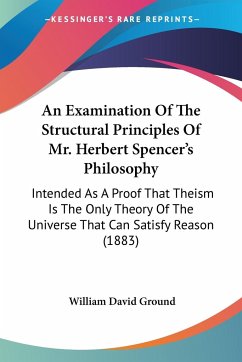
Mr. Herbert Spencer And The British Quarterly Review (1874)

PAYBACK Punkte
12 °P sammeln!
Mr. Herbert Spencer And The British Quarterly Review is a book written by Herbert Spencer in 1874. The book is a collection of essays and articles written by Spencer in response to criticisms made by the British Quarterly Review. The British Quarterly Review was a conservative publication that often criticized Spencer's work, particularly his views on evolution and social progress. In this book, Spencer defends his ideas and presents a detailed analysis of his theories on evolution, social progress, and the role of government in society. The book is an important contribution to the field of so...
Mr. Herbert Spencer And The British Quarterly Review is a book written by Herbert Spencer in 1874. The book is a collection of essays and articles written by Spencer in response to criticisms made by the British Quarterly Review. The British Quarterly Review was a conservative publication that often criticized Spencer's work, particularly his views on evolution and social progress. In this book, Spencer defends his ideas and presents a detailed analysis of his theories on evolution, social progress, and the role of government in society. The book is an important contribution to the field of social and political philosophy, and it remains a classic work in the history of ideas.This scarce antiquarian book is a facsimile reprint of the old original and may contain some imperfections such as library marks and notations. Because we believe this work is culturally important, we have made it available as part of our commitment for protecting, preserving, and promoting the world's literature in affordable, high quality, modern editions, that are true to their original work.












